eCommerce PPC management can seem complicated, but it can bring great returns if done right. Even without a dedicated PPC agency, you can see significant benefits.
The process might look simple, but it involves many details like keyword bidding, creating engaging ads, managing budgets, A/B testing, and analyzing data.
Let’s start with the basics: understanding what eCommerce PPC management is and its advantages.
eCommerce PPC Management: What Is It?
Pay-per-click (PPC) advertising allows online businesses to gain instant visibility and sales. The approach for managing eCommerce PPC is developing and keeping track of ad campaigns on search engines and social media.
Mastering PPC offers two paths:
- Learn the basics and start doing it yourself
- Seek help from a specialized agency.
Creating a campaign independently is quite achievable. Many advertising platforms like Amazon Ads provide a wide variety of ad types. Plus, there are lots of tools to help you optimize PPC ads.
| Advertising platform | Available Ad Types |
| Google Ads | Paid advertisements on search queries, mobile apps, videos, non-search websites |
| Amazon Ads | Sponsored Products, Sponsored Brands, Sponsored Display, Amazon DSP (Demand-Side Platform), Video, audio, custom and device ads |
| eBay Advertising | Promoted Listings Standard, Promoted Listings Advanced |
| Microsoft Advertising (former Bing Ads) | Search ads, Product ads, Shopping ads, Display ads, Video ads |
| YouTube | Skippable video ads, Non-skippable video ads, Bumper ads, Sponsored cards, Overlay ads |
| Facebook Ads | Image and video ads, Slideshow ads, Carousel ads, Instant Experience ads, Collection ads |
| Instagram Ads | Photo ads, Video ads, Carousel ads, Stories ads, IGTV ads |
| TikTok | In-feed ads, Brand takeover ads, Hashtag challenge ads, Branded effects |
| Sponsored content, Sponsored InMail, Sponsored jobs, Display ads, Dynamic ads |
Yet, if you find PPC management difficult to navigate or don’t have enough time to learn the skill, consider hiring an agency that provides eCommerce PPC services or a solo eCommerce PPC expert.
Benefits of eCommerce PPC Management
- Boost your website traffic – PPC management can rapidly boost your website traffic and enhance your online presence. In essence, a properly planned and carried out PPC campaign can bring a significant amount of visitors swiftly.
- Precise audience targeting – PPC enables your ads to reach those who are truly interested in your brand’s products or services by allowing precise audience targeting through specific data like demographics and browsing habits.
- Retarget marketing – Vital part of eCommerce PPC management, provides an opportunity to reconnect with interested individuals. This strategy enhances brand recall and encourages potential customers to make purchases, thereby increasing sales.
- Fine-tune conversion rates – Moreover, delving into PPC metrics provides insight into customer intent and buying triggers. This understanding can be leveraged to fine-tune conversion rates.
Step-By-Step Guide to Effective eCommerce PPC Management
Without a plan, your PPC campaign won’t be predictable or subject to analysis. Even if you win, you won’t be able to grow in campaign building.
From our experience, the following steps set a necessary structure for your success.
Step 1: Pre-Campaign Preparation
- Before launching your eCommerce PPC campaign, get to know your business and products well. Recognize what sets your business apart and what will make your PPC ads more attractive to your audience. Check your past marketing efforts, noting what worked and what could be better.
- Investigate your competitors’ PPC strategies as well. Examine their keywords, dissect their ad copies, and scrutinize their landing pages. Doing this will enable you to uncover opportunities and help your campaigns outshine others.
- Setting realistic goals for your campaign is something that should not be overlooked. The aims can include growth in the traffic level of the site, increase in sales, branding, and customer participation.

Use OKR Framework To Structure Objectives
To ensure the goals are achievable and the process is well structured, choose a framework to keep your PPC management in the loop. One framework that deserves our attention is OKR (Objectives and Key Results).
Here, you can choose numeric goals to be achieved during a certain period (your campaign timeframe) and track the processes that can influence their achievement.
| Objectives | Key Results |
|---|---|
| Employ PPC ads to become a pioneer in the online cloud service market. | – Attain a 40% or greater market share on ad impressions in our target market by the end of the last quarter. – Increase brand awareness by 25% as per the market research data and recall studies. – Achieve an average ad rank of 1.5 or better for our most valuable keywords. |
| Leverage PPC ads to create leads and sales. | – Enhance PPC-generated leads conversion by 15% in the next quarter. – Increase the volume of good quality leads from new market segments by 20% within the next six months. – Increase high potential leads from PPC campaigns by 25% within a year. |
| Adopt PPC advertising to support our international business growth. | – Launch PPC campaigns in three new international markets in the coming quarter and ensure that each campaign achieves only a 5% click-through rate (CTR). – Improve the number of clicks and conversion rates by 15% and 10%, respectively, for new campaigns every month during the year. – Maintain 300% ROAS for all international PPC campaigns. |
Use KPIs to Improve Your PPC Performance
The other way to control your progress and improve PPC performance is KPI (Key Performance Indicators). Examining the differentiation between KPIs and metrics will allow you to lay the foundation for success with PPC campaigns and reach various objectives.
You have to choose KPIs that are relevant to your business and link them to the appropriate metrics.
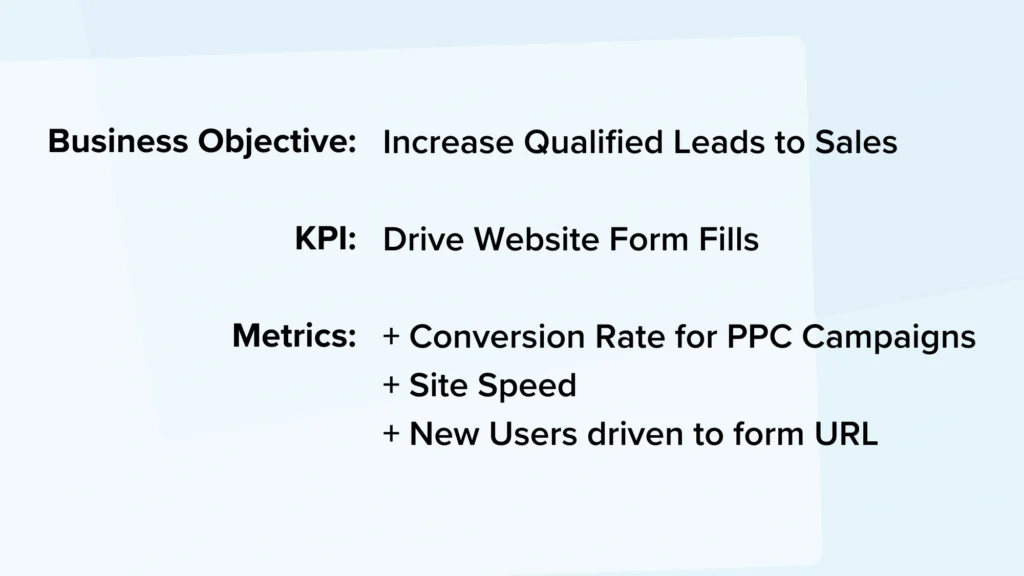
Step 2: Keywords Research for eCommerce PPC Campaigns
Effective keywords are crucial for your PPC campaigns. They help direct the right audience to your eCommerce site and drive conversions.
Spend time doing detailed keyword research to find terms that fit well with your products, brand, and target market.
Below are several tips to pay attention to.
Include Low-Volume Keywords
Don’t ignore low-volume keywords just because they aren’t as common. While they might bring less traffic, these keywords can help you tap into specialized market segments.
By using them effectively, you can extend your reach and become a trusted authority in your industry’s niche areas.
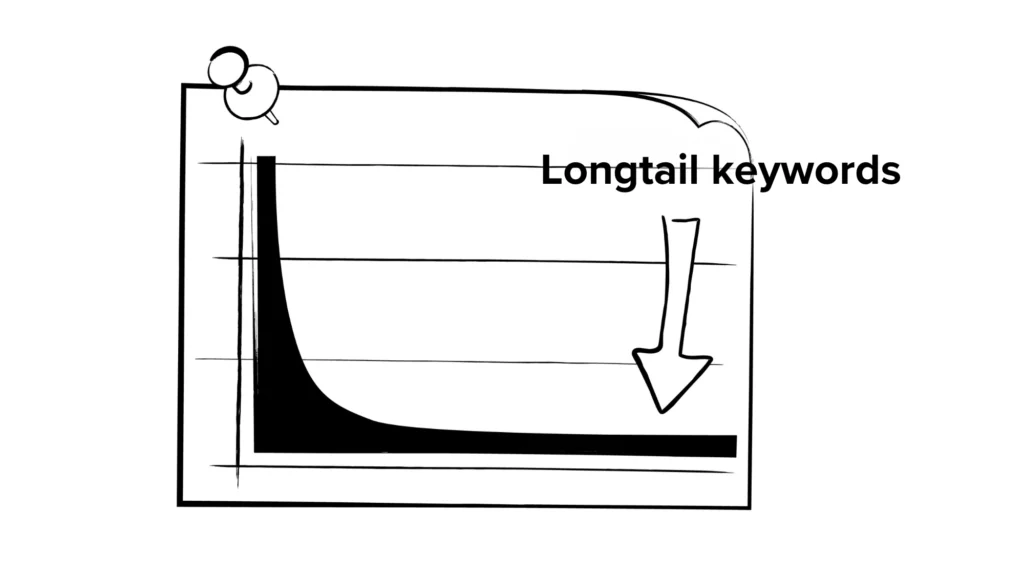
Use Exact and Broad Keywords
Selecting the best keywords means balancing between specific and broad terms. Use both exact keywords that match your product or service, as well as extended phrases that align with potential customers’ search terms. Thus, make sure your ads appear for users at different buying stages.
Leverage Keyword Research Tool
Using keyword research tools like Google Keyword Planner can enhance your keyword selection. Advanced tools like SE Ranking will help you find the right combination of keywords and suggest alternatives along with their crucial metrics like search volume, difficulty, intent, CPC, etc.
It also shows data from similar websites’ PPC campaigns and top ads for your keyword.
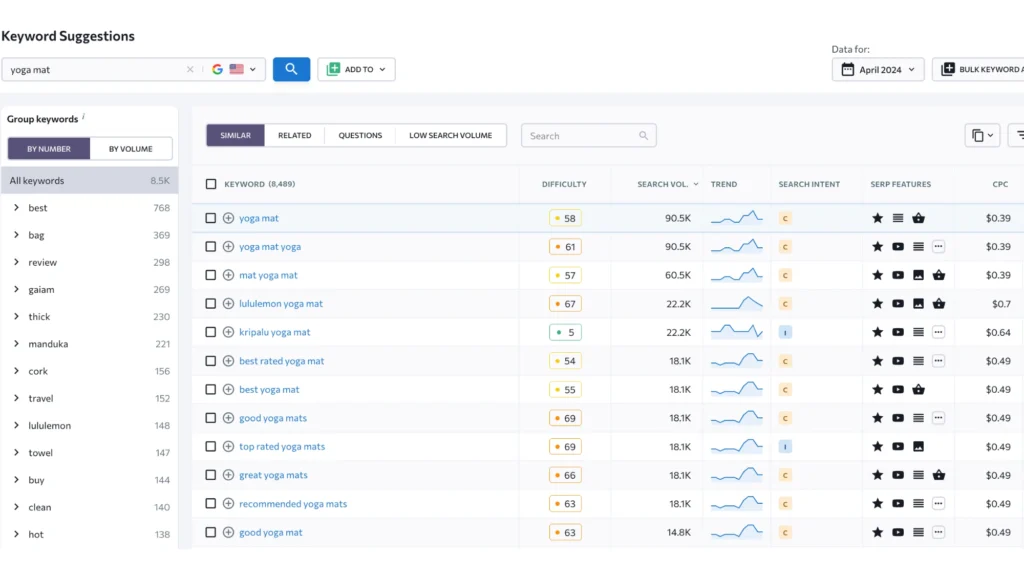
Select Negative Keywords
Remember, it’s not always about what you want to target but also about what you want to avoid. This is where negative keywords come in.
These are keywords that you don’t want triggering your ads. Careful use of negative keywords will help fine-tune your targeting, boost ad relevance, and reduce unnecessary spending on irrelevant clicks.
Step 3: Focus on Landing Page Efficiency
A good landing page is essential for eCommerce PPC campaigns. Lure your potential clients toward an action – purchasing a product, subscribing to a newsletter, or asking for additional information. Do not allow clutter or disturbances to distract away from the primary action.
The landing page should be:
- User-friendly
- Consistent with the ad, its images and message. This is a signal to the users that they are where they are supposed to be and it builds confidence.
- If the ad is a product offer, then the landing page should present that product along with its benefits.
- Employ clear CTAs and have a few form fields to simplify the process.
- As more people access the Internet from their mobile devices, the importance of landing pages being effectively displayed on smaller screens is growing. This involves modifying the design and content for touch navigation and smaller screen sizes.
Test your landing pages on various mobile devices so that you can identify and correct the necessary issues.
Here’s an example of an uncluttered landing page by TikTok:
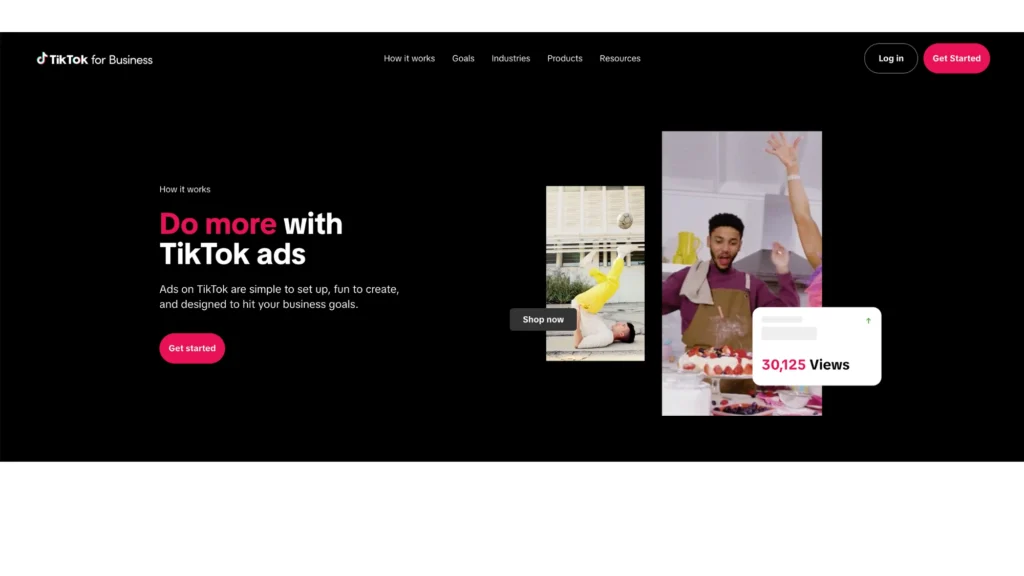
Step 4: Optimize Your eCommerce Ads
Working on eCommerce PPC management involves making a structured plan. This is about catching the viewer’s attention and persuading them to act.
Ad Titles and Descriptions
Your ad titles and descriptions should be brief, engaging, and full of related keywords. Show exclusive features, deals, or limited-time offers to appeal to users.
CTAs – Call to Actions
CTAs are crucial in leading users to make a purchase. Use phrases that inspire immediate actions, like:
- Buy Now
- See Our Range
- Claim Your Discount
Test different CTAs to find ones that resonate with your audience. Compare the response: “Buy Now” against “Find Your Dream Piece”.

A/B Testing
In A/B testing, you can try various ad elements and see which produce the most favorable results. Experiment with various:
- Headlines
- Descriptions
- CTAs
- Images
- Ad types
Test ads with differing types of products (book covers, snapshots, etc.) to determine what type of product gets more clicks and purchases.
Step 5: Monitor Key PPC Metrics
The control of eCommerce PPC metrics is necessary to assess the effectiveness of your approach and make some amendments.
When you are dealing with eCommerce PPC management, consider these indicators:
Click-Through Rates (CTRs)
This data provides the click-through rate of people exposed to online ads. It shows if your ads are attractive and actionable. On the other hand, a low CTR means that your ads are useless or you are reaching the wrong target audience.
In a perfect world, a 3-5% CTR is good, and if it’s below 1%, it’s necessary to change.
Conversion Rate
This is the percentage of site visitors who purchase a product or perform another task, like filling out a form after clicking on your advertisement. A high conversion rate indicates that your landing pages and offers are persuasive.
However, a low rate may also mean that your page is not appealing, or your targeting could be improved. It is not bad when you have a 5% or more conversion rate, but 2% or lower is discomforting.
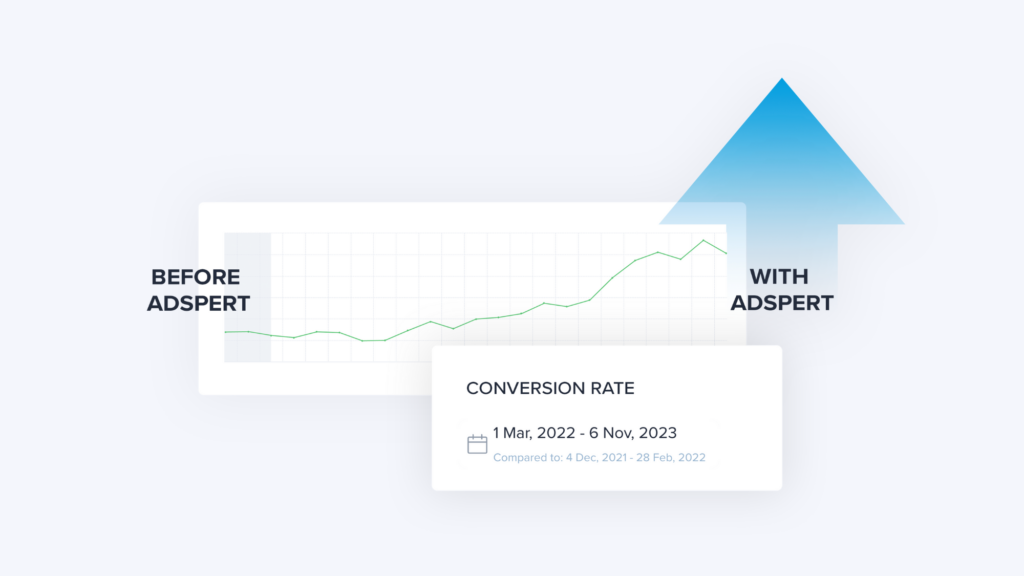
Cost Per Acquisition (CPA)
This metric calculates the average amount of money spent on acquiring a customer via your PPC campaigns. The lesser the CPA, the better, as it tells you that your cost per acquisition is more cost-effective.
A high CPA implies that you might have targeting, bidding, or ad messaging issues. If the CPA drops below the set cost per action – your campaign is successful. However, if it becomes too expensive, you should rethink your tactics.
PPC Management Responsibilities
The main PPC campaign management responsibilities are analyzing and optimizing your eCommerce advertising. Let’s simplify them:
- Monitoring and Adjusting. This means watching over your ads to see their performance and making any necessary changes to enhance their effectiveness, like modifying the ad content or design.
- Strategizing. Here, you outline what you want your eCommerce advertising to accomplish and figure out how to attain it. This may involve picking the right keywords, studying rivals’ actions, and deciding your bid amounts.

- Managing Budget. You need to ensure your advertising budget is well spent and aligned with company objectives.
- Execution. This involves all the practical tasks, like setting up ad groups and keywords, drafting the actual ad copy, and targeting your ads appropriately. This activity also includes staying updated with Google’s updates and latest strategies.
- Analysis and Improvement. The final aspect is observing how things are progressing and using that data to make more informed decisions in the future. This involves generating reports and using them to identify successful strategies so you can repeat them in the future.
PPC Manager, Agency or Tool?
Choosing between hiring a PPC specialist, hiring an eCommerce PPC agency or using a PPC tool for your eCommerce PPC management should be based on:
- Your budget
- Set of skills that you require
- Scale of your campaigns
- Your strategy type
Let’s briefly explore the advantages and potential downsides of PPC specialists, agencies and tools:
| PPC Specialist | PPC Agency | PPC Optimization Tool | |
|---|---|---|---|
| Pros | Solely focuses on your business’s PPC campaigns. | Brings a wealth of specialized expertise and experience. | Automates repetitive tasks, saving time and effort. |
| In-depth understanding of your business, industry, and target audience. | Have the resources and flexibility to scale PPC efforts. | Uses advanced algorithms for precise bid adjustments and keyword management. | |
| Immediate access to campaign data and decision-making processes. | Provide valuable insights and best practices from diverse industries. | Analyzes large datasets to find the best-performing ads and keywords. | |
| Cons | Significant time, resources, and financial investment are needed. | Service fees or retainer agreements can be costly. | Users need to familiarize themselves with the tool’s interface and features. |
| May have limited expertise compared to a specialized agency. | It requires effective communication and collaboration for alignment. | Needs initial setup and ongoing monitoring to stay aligned with business goals. | |
| Scaling PPC efforts can be challenging with limited resources. | Some control over campaign management and decision-making processes is lost. | Might not reach full potential without proper integration with your strategy. |
There’s many PPC optimization tools out there, but you can give Adspert a try for 30 days completely for free. With Adspert you can automate bidding based on your goals, leverage advanced keyword harvesting, explore the impact of different goals on your accounts’ performance, and make informed decisions with advanced analytics.
Plus, you don’t need your credit card and trial ends automatically, so there are no strings attached. Start free Adspert trial here.
Conclusion
Effectively running your PPC campaign can help boost your eCommerce business. It reveals your customers’ search interests, allowing you to target them better. This can enhance traffic, sales, and your overall visibility.
Yet, mastering eCommerce PPC management demands specific know-how. Therefore, you might consider harnessing a PPC optimization tool, agency services or employing a PPC specialist for faster and more reliable outcomes.




